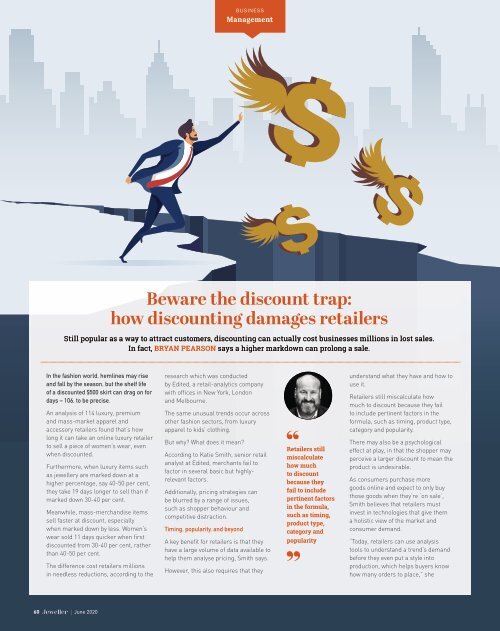Jeweller - June, Edition II 2020
• Shock value: How jewellers can adapt to and even benefit from the impact of COVID-19 • Brave new world: Preparing your business for the 'next normal' of retail • Double or nothing: experts reveal the key strategies to securing multiple-item sales
• Shock value: How jewellers can adapt to and even benefit from the impact of COVID-19
• Brave new world: Preparing your business for the 'next normal' of retail
• Double or nothing: experts reveal the key strategies to securing multiple-item sales
Create successful ePaper yourself
Turn your PDF publications into a flip-book with our unique Google optimized e-Paper software.
BUSINESS<br />
Management<br />
Beware the discount trap:<br />
how discounting damages retailers<br />
Still popular as a way to attract customers, discounting can actually cost businesses millions in lost sales.<br />
In fact, BRYAN PEARSON says a higher markdown can prolong a sale.<br />
In the fashion world, hemlines may rise<br />
and fall by the season, but the shelf life<br />
of a discounted $500 skirt can drag on for<br />
days – 106, to be precise.<br />
An analysis of 114 luxury, premium<br />
and mass-market apparel and<br />
accessory retailers found that’s how<br />
long it can take an online luxury retailer<br />
to sell a piece of women’s wear, even<br />
when discounted.<br />
Furthermore, when luxury items such<br />
as jewellery are marked down at a<br />
higher percentage, say 40-50 per cent,<br />
they take 19 days longer to sell than if<br />
marked down 30-40 per cent.<br />
Meanwhile, mass-merchandise items<br />
sell faster at discount, especially<br />
when marked down by less. Women’s<br />
wear sold 11 days quicker when first<br />
discounted from 30-40 per cent, rather<br />
than 40-50 per cent.<br />
The difference cost retailers millions<br />
in needless reductions, according to the<br />
research which was conducted<br />
by Edited, a retail-analytics company<br />
with offices in New York, London<br />
and Melbourne.<br />
The same unusual trends occur across<br />
other fashion sectors, from luxury<br />
apparel to kids’ clothing.<br />
But why? What does it mean?<br />
According to Katie Smith, senior retail<br />
analyst at Edited, merchants fail to<br />
factor in several basic but highlyrelevant<br />
factors.<br />
Additionally, pricing strategies can<br />
be blurred by a range of issues,<br />
such as shopper behaviour and<br />
competitive distraction.<br />
Timing, popularity, and beyond<br />
A key benefit for retailers is that they<br />
have a large volume of data available to<br />
help them analyse pricing, Smith says.<br />
However, this also requires that they<br />
Retailers still<br />
miscalculate<br />
how much<br />
to discount<br />
because they<br />
fail to include<br />
pertinent factors<br />
in the formula,<br />
such as timing,<br />
product type,<br />
category and<br />
popularity<br />
understand what they have and how to<br />
use it.<br />
Retailers still miscalculate how<br />
much to discount because they fail<br />
to include pertinent factors in the<br />
formula, such as timing, product type,<br />
category and popularity.<br />
There may also be a psychological<br />
effect at play, in that the shopper may<br />
perceive a larger discount to mean the<br />
product is undesirable.<br />
As consumers purchase more<br />
goods online and expect to only buy<br />
those goods when they’re ‘on sale’,<br />
Smith believes that retailers must<br />
invest in technologies that give them<br />
a holistic view of the market and<br />
consumer demand.<br />
“Today, retailers can use analysis<br />
tools to understand a trend’s demand<br />
before they even put a style into<br />
production, which helps buyers know<br />
how many orders to place,” she<br />
60 | <strong>June</strong> <strong>2020</strong>


















